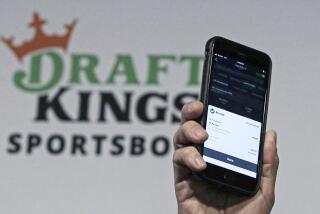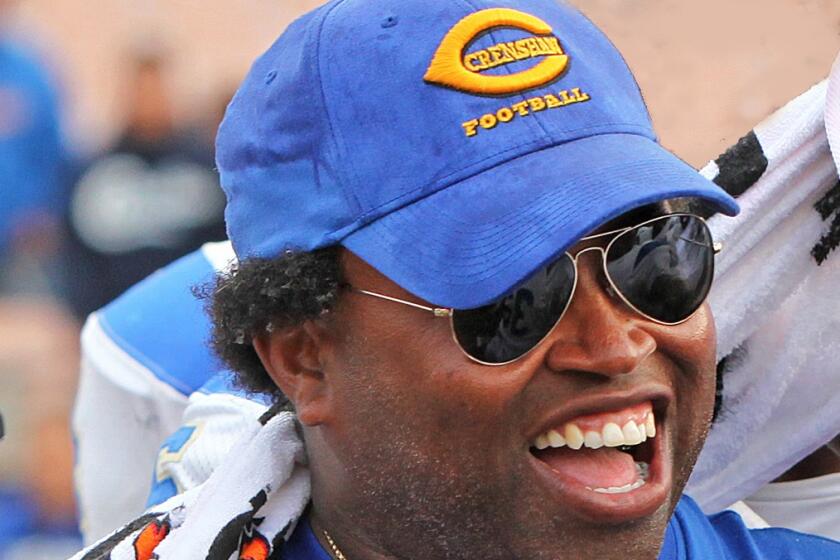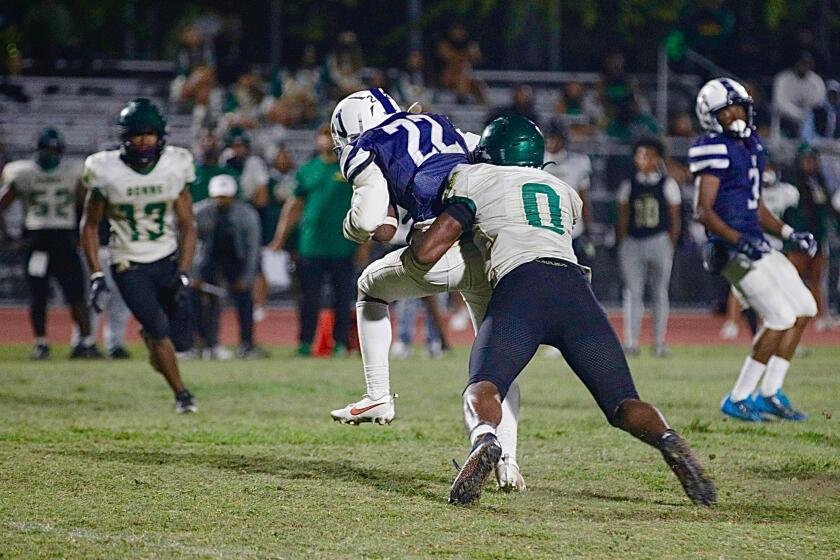Pro Football / Bob Oates : Is It an Impasse or Impossible? : Owners Seem Intent to Find a Break, Not a Breakthrough
Recent activities and developments havenŌĆÖt improved the credibility or image of National Football League club owners in their present dispute with players.
It became obvious last week that the owners are following a public-be-damned game plan.
The ticket-refund deadline was Tuesday in most NFL cities. Yet, Wednesday was the deadline for striking players to report, if they wanted to be paid for SundayŌĆÖs games.
In other words, ticket-holders had to decide Tuesday whether the strike would end Wednesday, or, in any case, before Sunday.
Hoping for the best, thousands held onto their tickets, enriching the ownersŌĆÖ strike fund.
A sports league respecting its fans would allow refunds all week. Or longer. Why not? Regardless of whoŌĆÖs at fault in this strike, the fans are blameless.
The ownersŌĆÖ game plan outline became even clearer Sunday when they terminated negotiations with the players in time to make the halftime shows of the non-union games.
A reasonable viewer could only conclude that the clubsŌĆÖ objective isnŌĆÖt to bargain but to break the strike by putting pressure on the strikers to give up.
For those who missed it, Joe Robbie, owner of the Miami Dolphins, laid it out in plain language: ŌĆ£We donŌĆÖt want any more strikes. ThatŌĆÖs why weŌĆÖre having these (non-union) games now.ŌĆØ
The end is laudable. The means are, at the least, mean-spirited.
One way to keep any strike going--if you want to keep it going--is to up the ante.
This has become still another element in the ownersŌĆÖ game plan.
After agreeing to a contract of three yearsŌĆÖ duration, theyŌĆÖre now asking for six years. A longer contract makes more sense, of course, but the owners have had at least six months to think about that and to have presented it long ago as a bargaining demand.
Though late changes are a fact of life at bargaining tables, by presenting this change now, the owners are seeking to add days or weeks to a strike that no football fan wants.
It becomes more certain every day that the playersŌĆÖ biggest mistake again this year was barring Commissioner Pete Rozelle as a mediator.
RozelleŌĆÖs record identifies him as the only statesman in the league--almost the only authentic leader--whether youŌĆÖre counting owners, players, administrators, or all of the above.
This has been true for 25 years.
For instance, early in his career, Rozelle carried the day on a pet scheme that has helped make most NFL people rich--equal TV revenue sharing for all.
He fought and defeated a majority of NFL owners on this issue. They wanted what baseball still has--their rights under the Constitution to make their own deals.
Then Rozelle went to Washington and persuaded Congress to authenticate his plan with a law that is still the law of the land.
Then and thereafter, clubs have paid the commissionerŌĆÖs salary without using player funds. Even so, Rozelle has consistently shown a much more moderate attitude toward the players than has any owner.
Had he mediated this dispute, it would doubtless be over now on terms more generous to the union than it will ever get from the NFLŌĆÖs hard-line element.
The owners, for this reason, donŌĆÖt want Rozelle as a mediator, either. But if the players demanded it, how could the owners refuse? HeŌĆÖs their commissioner.
HereŌĆÖs one way to look at this fight:
The 1,500 striking players, for the most part, are the best qualified candidates for their line of work. To get to where they are now, theyŌĆÖve had to pass many demanding tests, mental as well as physical, from a critical set of coaches and other overseers.
In contrast, the owners are a group with no particular football qualifications. With rare exceptions, theyŌĆÖve passed no NFL tests.
There are hundreds of other Americans with the same means and desires to own NFL clubs.
Some specifics:
--The average NFL owner is an individual whose only contribution is that he owns the team. He doesnŌĆÖt coach. He doesnŌĆÖt find the players. He doesnŌĆÖt put on the games.
He doesnŌĆÖt negotiate TV contracts. He doesnŌĆÖt bargain with the players, either individually or, in times like these, in groups. He doesnŌĆÖt sell any tickets--either literally or figuratively. He just owns.
--In Wall Street terms, an ownerŌĆÖs club is a cash cow. It is an uncommonly fat cash cow. Pro footballŌĆÖs cash flow is massive.
This isnŌĆÖt illegal--this is a perfectly proper way to make money--but itŌĆÖs a fact that millions of dollars are piled up at the front doors of NFL owners every month despite anything they do or donŌĆÖt do.
The owner doesnŌĆÖt get to keep it all. Much of it must be paid out in salaries and expenses. But a cash flow waterfall is every businessmanŌĆÖs goal, and an NFL owner has it.
--NFL owners live in a socialistŌĆÖs paradise, as the Cleveland BrownsŌĆÖ Art Modell often concedes. They share everything of substantial value from TV revenues ($17 million per club per year) to gate receipts.
What this means is that NFL owners arenŌĆÖt required to compete in any meaningful way, yet they gross more than $35 million per year apiece.
They donŌĆÖt compete for coaches--an owner rarely raids another owner for either a head coach or assistant.
They generally donŌĆÖt compete for fans.
And they refuse to compete for players. One of the sticking points in the present strike is that, for the owners, competition for players is out. Flatly.
TheyŌĆÖve announced that they wonŌĆÖt agree to any union proposition that might force them to compete with each other for employees in the sense that is natural and expected for all other U.S. businesses.
NFL clubs are more like public utilities than free enterprise entities, and may someday be enrolled as such.
However, the present situation is incongruous. Not having to compete against one another, the owners are left with only one option. Every time a bargaining agreement comes up for resolution, the owners compete against their own players.
More to Read
Go beyond the scoreboard
Get the latest on L.A.'s teams in the daily Sports Report newsletter.
You may occasionally receive promotional content from the Los Angeles Times.










